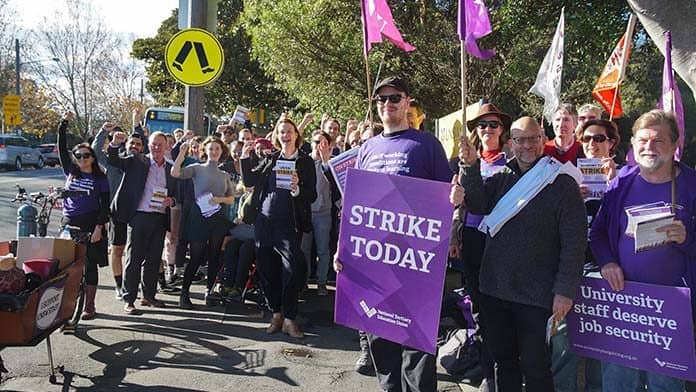Last Wednesday 30 May NTEU members at UNSW took part in a successful 24-hour strike.
Despite only having a few days to organise the strike, 150 staff and students stood side by side on well-attended picket lines from 8am in the morning. Pickets converged for a speak-out at midday and were joined by a contingent of CFMEU workers from university construction sites.
At the rally, UNSW NTEU Branch President Sarah Gregson announced 20 new staff joined the NTEU after being won over at pickets during the morning. During the speeches, the mention of Vice Chancellor Ian Jacobs’ ridiculous $1.22 million salary repeatedly drew cries of disgust from staff and students.
The strike was the first in their current enterprise bargaining round, with staff coming up against an intransigent management in their attempt to improve conditions and pay. Despite the fact bargaining has been going on for months key issues remained unresolved in the lead up to the strike.
Union demands focus on job security in the face of a series of restructures at UNSW as part of its “Strategy 2025”. Last year saw hundreds of professional staff lose their jobs as the university moves to centralise administration.
Teaching will also move to a trimester model based on three shorter ten-week semesters from next year, designed to allow it to enrol more students. As a picketing academic from the Paddington campus explained, “the university is trying to usher in a period of constant quick change with no consultation… compromising education to make money”. Last year The Australian reported that UNSW had spent $25 million on consultancy fees in a single year as part of the restructure.
In response to these attacks the union is trying to win professional staff the right to a redundancy review; something academic staff already have.
UNSW, like most universities, now relies on casual and temporary staff. The union estimates 73 per cent of staff are in insecure roles. Staff are demanding a specific commitment about the number of conversions from insecure to permanent positions as part of the trimester restructure. The roll-out will create a multitude of new roles over the next three years, but management have only committed to a measly 60 conversions university-wide.
Another key demand is around improved workload limits for academics in teaching focused roles. The union is demanding a maximum of five out of six semesters of face to face teaching, to allow time for course preparation, and a workload cap of 1610 hours per year. The union are also pushing for Aboriginal & Torres Strait Islander employment opportunities and pathways to employment and to increase superannuation for causal staff to 17 per cent to match other university staff.
The successful 24 hour strike has shown the kind of action that can push back Ian Jacobs’ onslaught and win the staff demands. As a striking staff member told Solidarity, “this matters because it affects not just staff but also the students… We want the best conditions for their education and also our careers and research”.
By Jazz Breen






